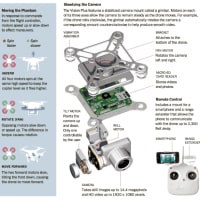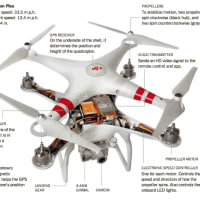
China's Cyber Threat A High-Stakes Spy Game
中国のサイバー脅威 いちかばちかのスパイゲーム
サイバー攻撃も激しさを増しているが、経済や政治の行き詰まりでアメリカが怒りの捌け口を求め、中国に向かっている。中国も大国意識が見え隠れして扱いにくい。 いやな兆候ではある。さて、間に位置する日本のスタンスは?
November 27, 2011

Cyber attacks on companies are part of a shadowy campaign in cyberspace being waged by China and other nations which goes largely undetected, according to Web security experts and analysts. 会社に仕掛けられるサイバー攻撃はサイバー空間で中国やその他の国々によって、繰り広げられる影の戦争の一部であるとセキュリティの専門家やアナリストは言う。
November 27, 2011
Ken Lieberthal of the Brookings Institution does a lot of work in China. Visiting about 10 times a year, he does some business consulting, meets with other scholars at universities and sometimes meets with government officials.
Like a lot of us these days, Lieberthal carries electronics with him to do his work. However, he takes a bit more precaution than many business travelers, as he tells weekends on All Things Considered guest host Rachel Martin.
ブルックリン・インスティテュートのケン・リーバーサルは中国の研究を多く行っている。 1年間の訪中は10回に上り、ビジネスコンサルタントの傍ら、大学の学者や政府関係者との交流もある。 今日の我々と同じように、彼にも仕事をするのに電子製品は欠かせない。しかしながら、彼は他の多くの旅行者よりも少しだけ事前の注意を怠らない。 “オールシングスコンシダード”のゲスト・ホストのレイチェル・マーチンに彼は次のように語った。
"I first of all get a loaner laptop. And the USB that I bring, I clean digitally before I bring it, so it's totally blank," Lieberthal says. Lieberthal then disconnects the Wi-Fi and Bluetooth functions, sets email filters and a virtual private network, or VPN. That's all before the trip. While in China, he never lets his Blackberry leave his side, never uses a wireless Internet connection while he has his USB drive plugged in, and he also physically hides his fingers when typing passwords. When he gets home, everything gets digitally wiped and cleaned. Why take all this precaution? Espionage. More specifically, cyber-espionage. The cloak-and-dagger world of corporate espionage is alive and well, and China seems to have the advantage. Their cyber-espionage program is becoming more and more effective at swiping information from America's public and private sectors. The U.S. government has even blamed China publicly for hacking American industries. It's not just business travelers at risk, either. In fact, any piece of digital data can be acquired through moles within the company or hackers operating half a world away.
「まず、代用ラップトップを手にいれます。 そしてUSBは自分で持って行きますが、事前に消去して、完全なブランクにしていきます。」とリーバーサルは言う。 そして、Wi-Fi や ブルートゥース機能を外し、eメールフィルターとバーチャル・プライベート・ネットワーク(VPN)をセットします。 これが旅行前にすることだ。 中国滞在中は、彼はブラックベリーを肌身離さず持ち歩き、USBドライブがプラグインされている時は、ワイヤレスインターネットは決して使用しません。そしてパスワードを打ち込むときは、他人に指の動きを見られないようにしています。帰国後は、全てを消去し、クリーンな状態に戻します。 なぜこのような用心をするかって? スパイです、もっと具体的にいうならサイバースパイです。 産業スパイの諜報活動の世界は実際に活発に行われています。 そして中国は優位性を保持しています。 彼らのサイバースパイ計画は、アメリカの公共民間を問わず、そこから情報を効果的に盗み出しています。 米国政府はアメリカの産業をハッキングしているとして、公に中国を非難さえしています。 それはビジネス旅行者のリスクだけに止まらないのです。実際、そんなデジタルデータも、企業内のスパイや地球の裏側のハッカーを通して入手されるのです。
China's Technological Front 中国の技術の最前線
James Lewis, who directs the technology program at the Center for Strategic and International Studies, says when the Chinese opened up their economy to the West, they decided one of things they needed was to upgrade their technology because they were falling behind. "The Chinese have, since 1986, been plugging steadily along at building up their technological capacities," Lewis tells NPR's Rachel Martin. "And that includes cyber-espionage." To be fair, Lewis says China is not the only country that has done this. A lot of countries engage in this kind of collection of electronic data, he says. "In so many countries, the telecom infrastructure is built to allow heavy surveillance by the government, and China is one of those places," he says.
国際戦略研究センター長のジェームス・ルイスは、中国が西側経済にその窓口を開いたとき、彼らは、彼らが必要とする一つのことを決定しました。それは西側諸国に遅れをとっている技術力の向上でした。 「以来、中国は1986年から、自分たちの技術能力の増強に沿って、そのギャップを着実に埋めてきたのです。そして、その一環としてサイバー諜報活動があるのです。」とルイス氏はNPRのレイチェル・マーチンに話した。 公平を期して言うならば、こういう活動をしているのは何も中国に限ったことではありません。 多くの国々が、この種の電子データの収集に関与していると同氏は語ります。 「多くの国々において、遠隔通信インフラは政府による強力な探査を可能にするように作られているのです、そして中国もそれらの国の一つなのです。」
The focus on China, Lewis says, is likely because the U.S. increasingly sees the nation as its closest economic and military competitor. The Chinese, he says, likely feel that way too. "Like it or not, the two of us are kind of spiraling into a competitive relationship that could involve military tensions that reach the point of conflict," he says. "That's why we're so concerned about them." The technology and defense industries are the most vulnerable, Lewis says. Those industries are areas China has identified that the nation needs to grow, but Chinese hackers have even broken into and stolen plans from American furniture manufacturers. "You can see the immediate economic benefit: You don't have to pay for the design, you can build it cheaper, and you can offer the same product at a lower price," he says. "That hurts our economy."
中国が注目を浴びるのは、それだけアメリカが中国を経済的にも、軍事的にも急速に台頭し、アメリカと肩を並べる存在になりつつあると認識しているからでしょう、とルイスは言う。 中国もまた同じように感じているのでしょう。 「好むと好まざるにかかわらず、この二つの国は競争関係のスパイラルに突入し、やがては紛争の種になる軍事的な緊張を含むまでになるでしょう。 だから我々は懸念を強めているのです。」 高度技術や国防産業が狙われているとルイスは言う。 これらの産業分野は中国が国家の成長に必要だと考えているからです、しかし、中国のハッカーたちは、アメリカの家具メーカーに対してさえ、侵入し、そこからデータを盗もうとしています。 「それは直接的な経済利益が期待できるからです。つまりデザインのコストをかけずに、安い価格で製作し、同じ製品を低価格で提供することができるのです。 これが我々の経済を脅かしています。」
The Cost Of Economic Espionage 経済諜報活動のコスト
The Chairman of the House Intelligence Committee is Republican Rep. Mike Rogers of Michigan. This week, Rogers, who is a former FBI agent, plans to bring forward a bill designed to put more pressure on China for alleged cyberattacks. "They are ferocious economic predators, and it is something we are going to have to deal with — and deal with it soon," Rogers tells Martin. This public naming and shaming is a new tactic. Up until recently, U.S. officials have been pressuring China behind closed doors. But a counter-intelligence report released last month directly accused China of hacking into the computer systems of American businesses. Rogers has actually spoken with executives from some of the American businesses hit by cyberattacks, and he says stolen intellectual property from just one hi-tech company cost them billions of dollars in research and revenue as well as thousands of U.S. jobs.
下院情報委員会の議長は共和党議員のマイク・ロジャース(ミシガン州選出)である。今週、ロジャース議員(前FBI局員)は、中国のサイバー攻撃疑惑について、中国に更なる圧力をかける法案を提出するつもりだ。 「彼らは、物凄い経済の略奪者だ、だから我々はこれに対処しなければならない、それもすぐに。」と、ロジャースはマーチンに言っている。 この公に名前をあげて、恥をかかせるというやり方は新しい戦術でもある。 最近まで、アメリカの高官は締め切った扉の裏で中国に圧力をかけていたが、先月出された対情報活動レポートは中国を名指しで、アメリカのビジネスのコンピュータシステムをハッキングしているとして非難している。 ロジャース議員は実際に、サイバー攻撃に見舞われたアメリカの幾つかの起業の経営陣と会談している。 彼によると、たった1社のハイテク会社から盗まれた知的財産だけでも研究費数十億ドルに相当し、それは米国の数千人分の仕事に相当するという。
"Those are 10,000 jobs that would be in this economy, that would employ Americans, that are gone because of Chinese economic espionage," he says. New estimates put losses from intellectual property espionage at about a trillion dollars a year, Rogers says. And he says U.S. companies that deal in intellectual property fall into two camps: those that know they've been hacked and those that don't know. "There really is no other exception than that," he says. Awareness of the threat and tracing the attacks to a specific government are two of the problems with cyber-espionage, Rogers says. Though he's confident they have evidence that China is actively involved in economic espionage, he says another issue is that companies that have been hacked are reluctant to come forward publicly.
「これらは1万人の仕事を経済的に生み出すほどで、アメリカ人の雇用機会は、この中国の経済的なスパイ活動で失われた」と彼は主張する。 新しい見積もりでは、失われた知的財産の価値は年間1兆ドルに上るという。 そして彼は、知的財産を扱う米国の会社は二つのグループ、即ち盗まれていることを自覚しているグループと、気づいていないグループに分けられるという。 「本当に例外なく盗まれているのです。」 驚異の認識とハッキング犯の政府の逆探知はサイバースパイの二つの問題である。 彼は、米国の企業が、中国が積極的にこの諜報(スパイ)活動に関与している証拠を掴んでいるということに確信をもっているが、もう一つの問題として、これらの企業がハッキングを受けている事実を公表したがらないということである。
"They realized that this would affect either their brand name or the fact that it might affect people wanting to invest in these particular companies," he says. The other issue, he says, is that companies feel that if they publicly acknowledge they've been hacked, it might open them up to future corporate espionage. Rogers hopes the new .S. tactic of accusing China publicly will help raise awareness of the issue and push it to the highest levels of the bilateral relationships the U.S. has with Russia, China and other nations. "It's very important that this become a bilateral trade issue so that we can finally get a handle on it," he says.
「彼らは、被害の公表が、会社のブランドネームを損ねるだけでなく、会社に投資を考えている投資家にも影響を与えることを良く知っている。」と彼は言う。 別の問題は企業が、公に彼らがハッキングを受けたと認めると、将来の企業の同様事件も常に公表せざるを得なくなるということである。 ロジャース氏は、新しい、この明示的に中国を非難する戦略は、問題への関心を高めて、その問題を二国間の首脳レベルの問題とするのに効果があると期待している。 つまり、米国とロシア、中国、そしてその他の国々である。 「この問題が二国間の貿易問題になることがとても重要だ、そうすることで我々は、この問題を動かす端緒を得る。」と彼は言う。
In response to the U.S. allegations, Wang Baodong, the spokesperson at the Chinese Embassy in Washington, sent a statement that says cyber-attacks are a global issue and hackers are striking everywhere. The statement also says the charges against China are "harmful not only to the interests of American travelers but also to increased exchanges between our two countries, and such [a] willful demonization effort against China should be stopped" Even though U.S. officials are convinced there's a cyber threat from China, they still don't know the extent of the attacks or exactly who is doing them, which makes it very hard to figure out how to make them stop.
アメリカのこのような訴えに対応して、ワシントンの中国大使館のワン・バオドン報道官は声明を出して、サイバー攻撃は世界全体の問題であり、ハッカーは世界中至る所にいるとし、「中国への非難はアメリカの旅行者の利益にならないばかりか、交流を深めている二国間にとっても関係を損なわせるものだ、またそのような意図的な中国極悪非道説を流すことは直ちにやめるべきだ」と反発している。 米国の高官が中国からのサイバー攻撃の脅威があると確信を持っていたとしても、その攻撃の程度或いは、誰がしているのかは判然としないままで、それが、攻撃を止めさせる方法を見出すことを困難にしている。
中国のサイバー脅威 いちかばちかのスパイゲーム
サイバー攻撃も激しさを増しているが、経済や政治の行き詰まりでアメリカが怒りの捌け口を求め、中国に向かっている。中国も大国意識が見え隠れして扱いにくい。 いやな兆候ではある。さて、間に位置する日本のスタンスは?
November 27, 2011

Cyber attacks on companies are part of a shadowy campaign in cyberspace being waged by China and other nations which goes largely undetected, according to Web security experts and analysts. 会社に仕掛けられるサイバー攻撃はサイバー空間で中国やその他の国々によって、繰り広げられる影の戦争の一部であるとセキュリティの専門家やアナリストは言う。
November 27, 2011
Ken Lieberthal of the Brookings Institution does a lot of work in China. Visiting about 10 times a year, he does some business consulting, meets with other scholars at universities and sometimes meets with government officials.
Like a lot of us these days, Lieberthal carries electronics with him to do his work. However, he takes a bit more precaution than many business travelers, as he tells weekends on All Things Considered guest host Rachel Martin.
ブルックリン・インスティテュートのケン・リーバーサルは中国の研究を多く行っている。 1年間の訪中は10回に上り、ビジネスコンサルタントの傍ら、大学の学者や政府関係者との交流もある。 今日の我々と同じように、彼にも仕事をするのに電子製品は欠かせない。しかしながら、彼は他の多くの旅行者よりも少しだけ事前の注意を怠らない。 “オールシングスコンシダード”のゲスト・ホストのレイチェル・マーチンに彼は次のように語った。
"I first of all get a loaner laptop. And the USB that I bring, I clean digitally before I bring it, so it's totally blank," Lieberthal says. Lieberthal then disconnects the Wi-Fi and Bluetooth functions, sets email filters and a virtual private network, or VPN. That's all before the trip. While in China, he never lets his Blackberry leave his side, never uses a wireless Internet connection while he has his USB drive plugged in, and he also physically hides his fingers when typing passwords. When he gets home, everything gets digitally wiped and cleaned. Why take all this precaution? Espionage. More specifically, cyber-espionage. The cloak-and-dagger world of corporate espionage is alive and well, and China seems to have the advantage. Their cyber-espionage program is becoming more and more effective at swiping information from America's public and private sectors. The U.S. government has even blamed China publicly for hacking American industries. It's not just business travelers at risk, either. In fact, any piece of digital data can be acquired through moles within the company or hackers operating half a world away.
「まず、代用ラップトップを手にいれます。 そしてUSBは自分で持って行きますが、事前に消去して、完全なブランクにしていきます。」とリーバーサルは言う。 そして、Wi-Fi や ブルートゥース機能を外し、eメールフィルターとバーチャル・プライベート・ネットワーク(VPN)をセットします。 これが旅行前にすることだ。 中国滞在中は、彼はブラックベリーを肌身離さず持ち歩き、USBドライブがプラグインされている時は、ワイヤレスインターネットは決して使用しません。そしてパスワードを打ち込むときは、他人に指の動きを見られないようにしています。帰国後は、全てを消去し、クリーンな状態に戻します。 なぜこのような用心をするかって? スパイです、もっと具体的にいうならサイバースパイです。 産業スパイの諜報活動の世界は実際に活発に行われています。 そして中国は優位性を保持しています。 彼らのサイバースパイ計画は、アメリカの公共民間を問わず、そこから情報を効果的に盗み出しています。 米国政府はアメリカの産業をハッキングしているとして、公に中国を非難さえしています。 それはビジネス旅行者のリスクだけに止まらないのです。実際、そんなデジタルデータも、企業内のスパイや地球の裏側のハッカーを通して入手されるのです。
China's Technological Front 中国の技術の最前線
James Lewis, who directs the technology program at the Center for Strategic and International Studies, says when the Chinese opened up their economy to the West, they decided one of things they needed was to upgrade their technology because they were falling behind. "The Chinese have, since 1986, been plugging steadily along at building up their technological capacities," Lewis tells NPR's Rachel Martin. "And that includes cyber-espionage." To be fair, Lewis says China is not the only country that has done this. A lot of countries engage in this kind of collection of electronic data, he says. "In so many countries, the telecom infrastructure is built to allow heavy surveillance by the government, and China is one of those places," he says.
国際戦略研究センター長のジェームス・ルイスは、中国が西側経済にその窓口を開いたとき、彼らは、彼らが必要とする一つのことを決定しました。それは西側諸国に遅れをとっている技術力の向上でした。 「以来、中国は1986年から、自分たちの技術能力の増強に沿って、そのギャップを着実に埋めてきたのです。そして、その一環としてサイバー諜報活動があるのです。」とルイス氏はNPRのレイチェル・マーチンに話した。 公平を期して言うならば、こういう活動をしているのは何も中国に限ったことではありません。 多くの国々が、この種の電子データの収集に関与していると同氏は語ります。 「多くの国々において、遠隔通信インフラは政府による強力な探査を可能にするように作られているのです、そして中国もそれらの国の一つなのです。」
The focus on China, Lewis says, is likely because the U.S. increasingly sees the nation as its closest economic and military competitor. The Chinese, he says, likely feel that way too. "Like it or not, the two of us are kind of spiraling into a competitive relationship that could involve military tensions that reach the point of conflict," he says. "That's why we're so concerned about them." The technology and defense industries are the most vulnerable, Lewis says. Those industries are areas China has identified that the nation needs to grow, but Chinese hackers have even broken into and stolen plans from American furniture manufacturers. "You can see the immediate economic benefit: You don't have to pay for the design, you can build it cheaper, and you can offer the same product at a lower price," he says. "That hurts our economy."
中国が注目を浴びるのは、それだけアメリカが中国を経済的にも、軍事的にも急速に台頭し、アメリカと肩を並べる存在になりつつあると認識しているからでしょう、とルイスは言う。 中国もまた同じように感じているのでしょう。 「好むと好まざるにかかわらず、この二つの国は競争関係のスパイラルに突入し、やがては紛争の種になる軍事的な緊張を含むまでになるでしょう。 だから我々は懸念を強めているのです。」 高度技術や国防産業が狙われているとルイスは言う。 これらの産業分野は中国が国家の成長に必要だと考えているからです、しかし、中国のハッカーたちは、アメリカの家具メーカーに対してさえ、侵入し、そこからデータを盗もうとしています。 「それは直接的な経済利益が期待できるからです。つまりデザインのコストをかけずに、安い価格で製作し、同じ製品を低価格で提供することができるのです。 これが我々の経済を脅かしています。」
The Cost Of Economic Espionage 経済諜報活動のコスト
The Chairman of the House Intelligence Committee is Republican Rep. Mike Rogers of Michigan. This week, Rogers, who is a former FBI agent, plans to bring forward a bill designed to put more pressure on China for alleged cyberattacks. "They are ferocious economic predators, and it is something we are going to have to deal with — and deal with it soon," Rogers tells Martin. This public naming and shaming is a new tactic. Up until recently, U.S. officials have been pressuring China behind closed doors. But a counter-intelligence report released last month directly accused China of hacking into the computer systems of American businesses. Rogers has actually spoken with executives from some of the American businesses hit by cyberattacks, and he says stolen intellectual property from just one hi-tech company cost them billions of dollars in research and revenue as well as thousands of U.S. jobs.
下院情報委員会の議長は共和党議員のマイク・ロジャース(ミシガン州選出)である。今週、ロジャース議員(前FBI局員)は、中国のサイバー攻撃疑惑について、中国に更なる圧力をかける法案を提出するつもりだ。 「彼らは、物凄い経済の略奪者だ、だから我々はこれに対処しなければならない、それもすぐに。」と、ロジャースはマーチンに言っている。 この公に名前をあげて、恥をかかせるというやり方は新しい戦術でもある。 最近まで、アメリカの高官は締め切った扉の裏で中国に圧力をかけていたが、先月出された対情報活動レポートは中国を名指しで、アメリカのビジネスのコンピュータシステムをハッキングしているとして非難している。 ロジャース議員は実際に、サイバー攻撃に見舞われたアメリカの幾つかの起業の経営陣と会談している。 彼によると、たった1社のハイテク会社から盗まれた知的財産だけでも研究費数十億ドルに相当し、それは米国の数千人分の仕事に相当するという。
"Those are 10,000 jobs that would be in this economy, that would employ Americans, that are gone because of Chinese economic espionage," he says. New estimates put losses from intellectual property espionage at about a trillion dollars a year, Rogers says. And he says U.S. companies that deal in intellectual property fall into two camps: those that know they've been hacked and those that don't know. "There really is no other exception than that," he says. Awareness of the threat and tracing the attacks to a specific government are two of the problems with cyber-espionage, Rogers says. Though he's confident they have evidence that China is actively involved in economic espionage, he says another issue is that companies that have been hacked are reluctant to come forward publicly.
「これらは1万人の仕事を経済的に生み出すほどで、アメリカ人の雇用機会は、この中国の経済的なスパイ活動で失われた」と彼は主張する。 新しい見積もりでは、失われた知的財産の価値は年間1兆ドルに上るという。 そして彼は、知的財産を扱う米国の会社は二つのグループ、即ち盗まれていることを自覚しているグループと、気づいていないグループに分けられるという。 「本当に例外なく盗まれているのです。」 驚異の認識とハッキング犯の政府の逆探知はサイバースパイの二つの問題である。 彼は、米国の企業が、中国が積極的にこの諜報(スパイ)活動に関与している証拠を掴んでいるということに確信をもっているが、もう一つの問題として、これらの企業がハッキングを受けている事実を公表したがらないということである。
"They realized that this would affect either their brand name or the fact that it might affect people wanting to invest in these particular companies," he says. The other issue, he says, is that companies feel that if they publicly acknowledge they've been hacked, it might open them up to future corporate espionage. Rogers hopes the new .S. tactic of accusing China publicly will help raise awareness of the issue and push it to the highest levels of the bilateral relationships the U.S. has with Russia, China and other nations. "It's very important that this become a bilateral trade issue so that we can finally get a handle on it," he says.
「彼らは、被害の公表が、会社のブランドネームを損ねるだけでなく、会社に投資を考えている投資家にも影響を与えることを良く知っている。」と彼は言う。 別の問題は企業が、公に彼らがハッキングを受けたと認めると、将来の企業の同様事件も常に公表せざるを得なくなるということである。 ロジャース氏は、新しい、この明示的に中国を非難する戦略は、問題への関心を高めて、その問題を二国間の首脳レベルの問題とするのに効果があると期待している。 つまり、米国とロシア、中国、そしてその他の国々である。 「この問題が二国間の貿易問題になることがとても重要だ、そうすることで我々は、この問題を動かす端緒を得る。」と彼は言う。
In response to the U.S. allegations, Wang Baodong, the spokesperson at the Chinese Embassy in Washington, sent a statement that says cyber-attacks are a global issue and hackers are striking everywhere. The statement also says the charges against China are "harmful not only to the interests of American travelers but also to increased exchanges between our two countries, and such [a] willful demonization effort against China should be stopped" Even though U.S. officials are convinced there's a cyber threat from China, they still don't know the extent of the attacks or exactly who is doing them, which makes it very hard to figure out how to make them stop.
アメリカのこのような訴えに対応して、ワシントンの中国大使館のワン・バオドン報道官は声明を出して、サイバー攻撃は世界全体の問題であり、ハッカーは世界中至る所にいるとし、「中国への非難はアメリカの旅行者の利益にならないばかりか、交流を深めている二国間にとっても関係を損なわせるものだ、またそのような意図的な中国極悪非道説を流すことは直ちにやめるべきだ」と反発している。 米国の高官が中国からのサイバー攻撃の脅威があると確信を持っていたとしても、その攻撃の程度或いは、誰がしているのかは判然としないままで、それが、攻撃を止めさせる方法を見出すことを困難にしている。



















